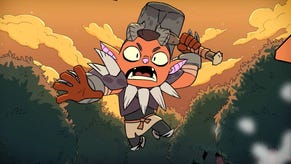Stop slagging us off, says riled BBFC
BBFC boss David Cooke's responded angrily to recent concerns over the affects of Byron Report proposals that will lend the body responsibility to rate all adult games.
Both EA and Microsoft have hit out at the plans, saying games are likely to become later and more expensive in Britain. Not so, said Cooke.
"The BBFC’s current average turnaround time for games classifications is eight calendar days. In terms of international comparisons, this is notably quick. There is no reason why the increased role for the BBFC envisaged by Dr Byron should lead to delays."
He added:
“The games industry really does have nothing to fear from a set of proposals which would provide more robust, and fully independent, decisions, and detailed content advice, for the British public, and especially parents. The Byron proposals, far from envisaging the collapse of PEGI, specifically provide for a continuing PEGI presence in UK games classification. They also provide significant opportunities to reduce duplication of effort and costs. And they would make wider use of a system, the BBFC’s, which British parents recognize, trust and have confidence in.”
Press release after the link.
BBFC REJECTS CRITICISM OF BYRON GAMES CLASSIFICATION PROPOSALS
The BBFC’s Director, David Cooke, today rejected criticisms from some quarters of the games industry of the Byron Report proposals for games industry.
He said:
“We are disappointed and concerned about attempts by one or two video games publishers to pre-empt, through recent press statements, the forthcoming public consultation on video games classification. Their statements are misleading in several respects:
The BBFC’s current average turnaround time for games classifications is eight calendar days. In terms of international comparisons, this is notably quick. There is no reason why the increased role for the BBFC envisaged by Dr Byron should lead to delays.
BBFC classifications are already cheaper for many games than those under the Pan European Games Information System (PEGI). Because the BBFC currently deals mainly with the most problematic games, BBFC costs will fall if, as Dr Byron recommended, we take on all games, physical and online, rated ‘12’ and above.
It is absurd to imply that the BBFC could not cope, or would need “a building the size of Milton Keynes”. The BBFC is a larger and better resourced organisation than PEGI, and is well used to gearing up, and to providing fast-track services where appropriate.
We reject any suggestions that the Byron proposals for dealing with online games are not future-proof. Countries such as the USA and Germany already classify such games in a way which reflects national cultural sensibilities. The BBFC has made clear that we are prepared to work through PEGI Online, which already recognizes BBFC symbols. But, with online games, the real need is not a pan-national grouping of markets, but rather soundly based and independent initial classification, full information provision, and responsible self-regulation of online game-play backed by properly resourced independent monitoring and complaints mechanisms.
“The games industry really does have nothing to fear from a set of proposals which would provide more robust, and fully independent, decisions, and detailed content advice, for the British public, and especially parents. The Byron proposals, far from envisaging the collapse of PEGI, specifically provide for a continuing PEGI presence in UK games classification. They also provide significant opportunities to reduce duplication of effort and costs. And they would make wider use of a system, the BBFC’s, which British parents recognize, trust and have confidence in.”





.png?width=291&height=164&fit=crop&quality=80&format=jpg&auto=webp)


